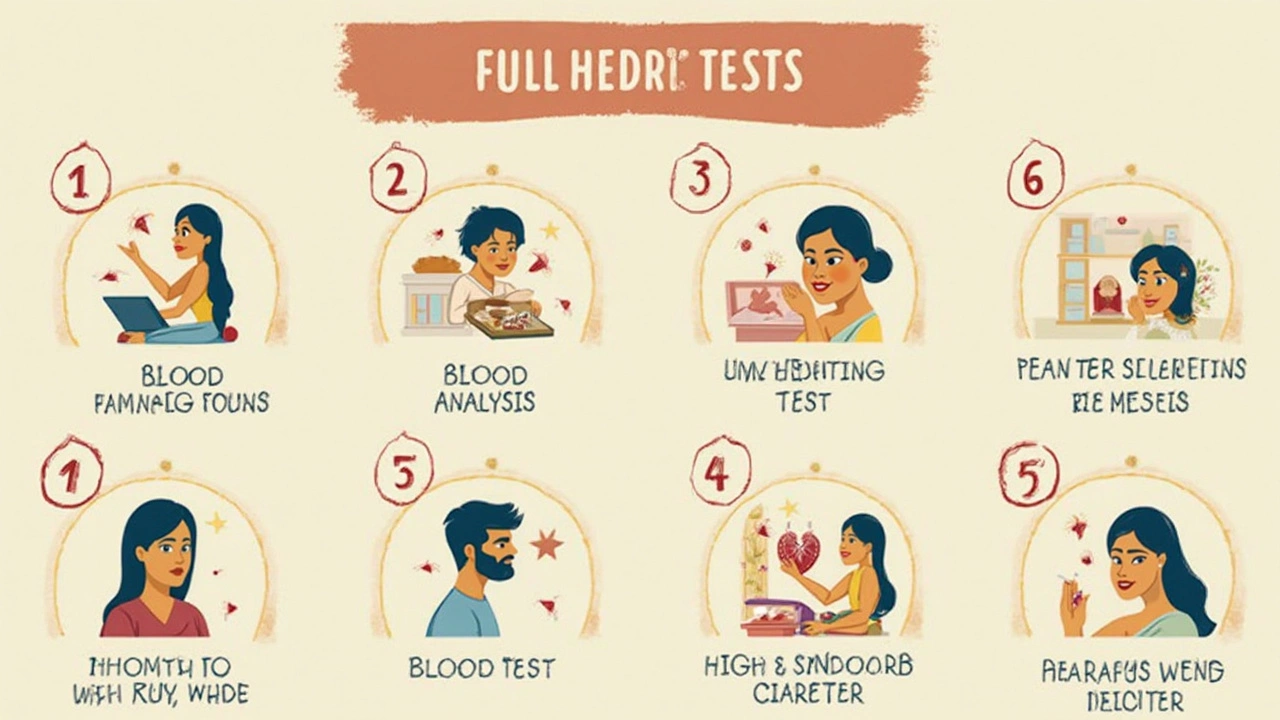Best Test for Full Body Checkup: What Works and Why
 May, 13 2025
May, 13 2025
Ever felt overwhelmed by the long lists in those full body checkup packages? You’re not alone. Health packages can look like a menu at a fancy restaurant—endless choices, half of them in medical jargon. But the real question: which tests actually matter, and which are just fluff?
Most people tend to think the more tests, the better. Not always true. A good full body checkup looks at the basics—blood sugar, cholesterol, kidney, liver, thyroid, and a handful of others. These catch the stuff that sneaks up on you, like diabetes or slow-moving kidney issues. Other tests, like Vitamin D or certain hormone checks, are not always needed unless you’ve got specific symptoms or a family history.
If you go to any lab or hospital, they’ll probably try to upsell you on fancy scans or genetic tests. That’s rarely useful unless your doctor recommends it for a reason. The smart move? Go for quality, not quantity. Understand what you’re getting checked and why. And always ask if you need that extra test or if it’s just marketing.
- What Counts as a Full Body Checkup
- Tests that Matter (and Tests You Can Skip)
- Tips to Get the Most Accurate Results
- How to Pick the Right Health Package
What Counts as a Full Body Checkup
You’d think a full body checkup covers absolutely everything, but it’s really about looking for the most common health problems before they turn serious. Testing for major organs, basic functions, and lifestyle diseases is standard. There’s no perfect checklist that fits everyone, but a proper package shouldn’t skip out on certain basics.
Here’s what a standard full body checkup usually includes:
- Blood sugar (fasting and postprandial)
- Complete blood count (CBC)
- Liver function tests (LFT)
- Kidney function tests (KFT)
- Lipid profile (cholesterol and triglycerides)
- Thyroid function test (TSH, sometimes T3/T4)
- Urine routine
- ECG (heart electrical activity check)
- Chest X-ray
- Blood pressure measurement
Other common checks thrown in, depending on your age or risk factors, might be:
- Vitamin D and B12 levels
- HbA1c (3-month average blood sugar)
- Ultrasound of abdomen
- Prostate/PSA (men over 50)
- Pap smear or mammogram (women over 40)
But you shouldn’t feel pressured into doing every test in the book. If you’re healthy and under 30, many of the scans are overkill unless you have a family history or specific symptoms. Remember, the point is smart screening, not a fishing expedition.
If you’re curious how these basics stack up, here’s a simple table—you’ll see most health packages tick these boxes. Anything wildly outside this should raise an eyebrow, or at least a few questions.
| Test/Screening | Purpose | When Needed |
|---|---|---|
| Blood Sugar | Spot diabetes/early sugar problems | Yearly or if you have risk |
| Cholesterol Panel | Check heart risk | Yearly from age 30 |
| CBC | Detect anemia, infection | Yearly |
| Liver/Kidney Panel | Measure organ health | Yearly or with symptoms |
| ECG | Heart rhythm check | Yearly after age 40, or if symptoms |
The key is: don’t chase “full body” for the sake of the name. Focus on proven tests that actually catch real health issues early. If anything is unclear in your package, don’t hesitate—call the clinic and ask.
Tests that Matter (and Tests You Can Skip)
If you’re staring at a long list of tests, here’s the honest truth: not everything on that list really matters for everyone. There are the must-haves that should be in every full body checkup, and then there are the tests that usually do nothing but add to your bill.
The core tests you want are actually pretty standard. These are the ones that catch common problems early and give a clear idea about your general health:
- Blood sugar (Fasting and Postprandial): Checks for diabetes and prediabetes. Around 1 in 10 adults worldwide have diabetes, and most don’t even know they do.
- Complete Blood Count (CBC): Flags anemia, infections, and sometimes blood cancers.
- Lipid Profile: This is for cholesterol. High cholesterol sneaks up on you, and it’s one of the biggest triggers for heart disease.
- Liver and Kidney Function: Both are filter systems for your body. Damage shows up here long before you notice symptoms.
- Thyroid Function: Hypothyroid or hyperthyroid issues are surprisingly common, especially in women.
- Urine Routine Exam: Looks for infections, diabetes clues, or early kidney problems.
Some people need extra checks. If you have a family history of heart issues, a basic ECG or cardiac risk markers can be smart. Same goes for Vitamin D or B12 if you’re often tired or have bone/joint pain. But these aren’t must-dos for every healthy adult. Genetic testing, cancer marker panels (like CA-125 or PSA), or full-body scans? Save those for specific concerns, not basic screening. Doing dozens of tests without real reason can lead to unnecessary worry and even pointless treatments.
Compare some sample tests found in popular checkup packages below:
| Test | Why It Matters | Who Needs It |
|---|---|---|
| CBC | Finds anemia, infection | Everyone |
| Lipid Profile | Heart risk, cholesterol | Adults over 20 |
| Liver/Kidney Function | Early organ problems | Everyone, especially 30+ |
| Thyroid Profile | Common gland disorder | Mainly women, but useful for all |
| Vitamin D/B12 | Deficiency screening | Low energy, bone pain, vegetarians |
| ECG | Heart rhythm issues | Family history, chest pain |
| PSA/CA-125 | Cancer screening | Only if symptoms or high risk |
If your health checkup package is pushing long cancer panels, hormone tests, or every vitamin on the chart, double-check with your doctor. Most healthy adults just don’t need those unless there’s a real concern.
Bottom line: stick with the basics, go deeper only if your symptoms or personal risk say so. It’s less about having a giant checklist and more about catching what matters early.

Tips to Get the Most Accurate Results
Getting checked is step one. Doing it right is step two. Your results are only as good as how you prep for the tests. Mess that up, and you could get a false scare, or miss something important. Here’s how to make sure your full body checkup tells the truth about your health.
- Fast Carefully: For most blood tests—like blood sugar and cholesterol—you need to fast for 8–12 hours. Black coffee (no sugar), plain water, and most medications are okay unless your doctor says stop.
- Stay Hydrated: Drink water, especially before a blood draw. Dehydration can thicken blood and mess up readings, especially for kidney and electrolyte panels.
- Skip Heavy Workouts: Strenuous exercise just before testing can bump up your liver enzymes and creatinine. Take it easy the day before.
- Avoid Fatty Foods: That butter chicken or pizza? Save it for later—greasy meals can spike your cholesterol test and liver function readings.
- Meds Matter: Always tell the lab or doctor about your medications. Stuff like steroids or even vitamin supplements can change certain results.
- Pick the Right Day: If you have your period or are fighting a cold, let your doctor know. Some tests (like urine analysis or white blood cell counts) might get skewed.
Need a quick look at how different habits affect test results? Here’s a simple table:
| Habit | Possible Impact on Tests |
|---|---|
| Big late-night meal | Raises blood sugar, cholesterol, liver readings |
| No fasting | Incorrect blood sugar or lipid profile |
| Heavy workout | Raises muscle and liver enzymes |
| Not enough water | Can fake higher creatinine and abnormal kidney results |
| Taking vitamins or supplements | Messes with vitamin/mineral lab values |
One last thing—don’t psych yourself out about the results. If something looks off, just calmly double-check with your doctor. Labs can get things wrong, especially if prep went sideways. Your body isn’t a machine, and numbers bounce around.
How to Pick the Right Health Package
Shopping for a health checkup package can feel like grocery shopping when you’re hungry—tempting to add way too much to your cart. But here’s a reality check: more isn’t better with screenings. You want the basics covered but don’t need random extras that don’t make sense for you. Picking the best package actually saves money and avoids pointless stress over results you don’t understand.
Start with your age and family history. Most healthy adults under 40 with no major risk factors won’t need cancer marker tests or advanced scans. If you’re 40 or above, or if you’ve got close relatives with diabetes, heart disease, or high cholesterol, you’ll want to be a bit more thorough. For everyone, look for packages that include the following musts:
- Basic blood tests (CBC, blood sugar, kidney, and liver function)
- Lipid profile (for cholesterol and heart disease risk)
- Thyroid function
- Urine test
- ECG or basic heart screening (especially above 35)
If a package throws in Vitamin B12, D, or hormone tests, check if you have symptoms or a reason. Ask the clinic about every test—they should be able to explain why it matters to full body checkup.
Watch for aggressive upselling. Packages often add on fertility hormones, allergy markers, or cancer tests just to hike the price. According to a 2023 survey by the Indian Medical Association, nearly 60% of people bought tests they didn’t need because the package looked “complete”—but only 28% of those extras were ever acted on by a doctor.
Here’s a quick comparison of what you actually need versus what’s often included as ‘extras’:
| Essential Tests | Common Unnecessary Add-ons |
|---|---|
| Blood Sugar, CBC, Lipid Profile, Liver/Kidney Function, Thyroid, ECG | Vitamin Panels, Cancer Markers, Genetic Tests, Food Allergy Panels, Advanced Hormone Tests (for most people) |
Finally, check if the center has clear reporting and quick doctor consults. After all, any decent package should come with help understanding your results—not just charts and numbers. And don’t forget, you can always build your own personalized package at most labs instead of picking one off the shelf. It’s worth asking!